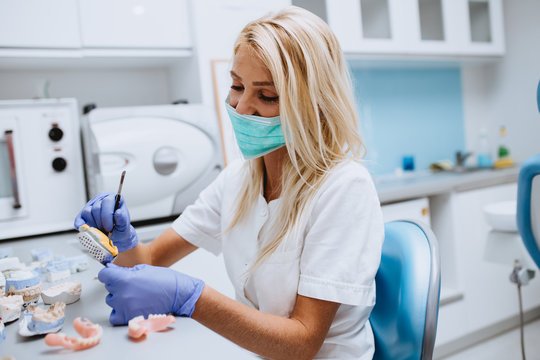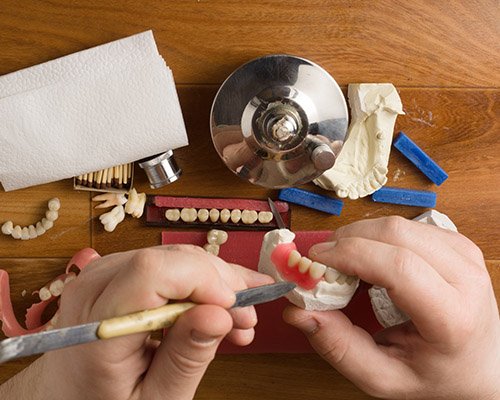Sustainability is becoming a driving force across industries, and the dental sector is no exception. Dental laboratories, which play a crucial role in producing crowns, bridges, dentures, and other restorations, consume significant energy, materials, and resources. As awareness of environmental issues grows, many labs are taking steps to adopt eco-friendly practices that reduce their carbon footprint while maintaining high-quality outcomes.
Going green isn’t just good for the planet—it’s also good for business. Sustainable practices can lower operating costs, improve efficiency, and attract environmentally conscious clients. Here are some strategies dental labs can use to embrace sustainability.

1. Energy Efficiency in Daily Operations
Dental labs rely heavily on equipment like furnaces, milling machines, and 3D printers, all of which consume large amounts of energy.
- Switch to energy-efficient equipment: Newer models often use less power and are designed with sustainability in mind.
- LED lighting: Replace fluorescent or incandescent bulbs with energy-saving LEDs.
- Smart energy management: Use timers and smart plugs to ensure machines and lights are switched off when not in use.
- Renewable energy adoption: Installing solar panels can significantly reduce electricity bills and reliance on fossil fuels.
2. Sustainable Materials and Waste Reduction
Material use is one of the largest contributors to a lab’s environmental impact.
- Eco-friendly materials: Choose biocompatible resins and ceramics with lower environmental impact.
- Digital workflows: CAD/CAM and 3D printing reduce the need for physical impressions, plaster models, and shipping materials.
- Material recycling: Recycle metals, gypsum, and other lab by-products where possible.
- Minimize packaging waste: Use biodegradable or recyclable packaging for shipping cases to clinics.
3. Water Conservation
Labs that handle plaster, ceramics, and polishing processes use significant amounts of water.
- Closed-loop water systems: Reuse and recycle water in polishing and cooling processes.
- Water-efficient equipment: Invest in machines designed to minimize water waste.
- Leak prevention: Regularly maintain equipment to avoid unnoticed water loss.
4. Reduce Carbon Footprint with Digital Dentistry
Digitalization is inherently more sustainable than traditional workflows.
- Digital impressions eliminate the need for disposable impression trays, alginate, and shipping physical models.
- Cloud-based case management reduces paper usage.
- Remote collaboration with dentists and technicians cuts down on unnecessary travel.
By moving to fully digital workflows, labs can significantly cut material waste and carbon emissions.
5. Implement Recycling and Waste Management Programs
- Set up dedicated recycling bins for metals, plastics, and paper.
- Safely dispose of hazardous materials like chemicals and solvents through approved recycling facilities.
- Work with suppliers who offer take-back programs for unused or expired materials.
6. Green Procurement and Supply Chain
Sustainability isn’t just about in-house practices—it extends to the supply chain.
- Choose eco-conscious suppliers who provide recyclable packaging and green-certified products.
- Buy in bulk to minimize packaging waste and shipping frequency.
- Support local suppliers to reduce transportation emissions.
7. Foster a Culture of Sustainability
Your team is central to the success of eco-friendly initiatives.
- Training: Educate staff on sustainable practices, such as minimizing material waste or turning off equipment.
- Green policies: Establish clear guidelines for recycling, energy saving, and responsible material handling.
- Employee involvement: Encourage technicians to share ideas for improving sustainability in everyday tasks.
8. Communicate Your Green Commitment
Eco-friendly practices can also become a marketing advantage.
- Highlight sustainability efforts on your website and social media.
- Include eco-friendly certifications or practices in your marketing materials.
- Share your progress with dentists who value working with environmentally responsible partners.
Conclusion
Sustainability is no longer optional—it’s an essential part of building a future-ready dental laboratory. By adopting eco-friendly practices in energy use, materials, water management, and digital workflows, labs can significantly reduce their environmental impact while improving efficiency and client trust.
Becoming a sustainable dental lab not only benefits the environment but also positions your business as a leader in innovation, responsibility, and long-term growth.
Related Reads
- Custom Fitness App Development: Build the Fitness App Your Users Actually Want
- What Is a Waterproof Tarpaulin and How Does It Work?
- Balanced Living: How to Thrive in a Fast-Paced World
- Icad Abu Dhabi – Driving Industrial Growth in the UAE
- Which Cosmetic Procedures Are Most Popular with Patients in Sienna?
- Eco Air Duct Cleaning The Smart Green Way to Breathe Cleaner Air



